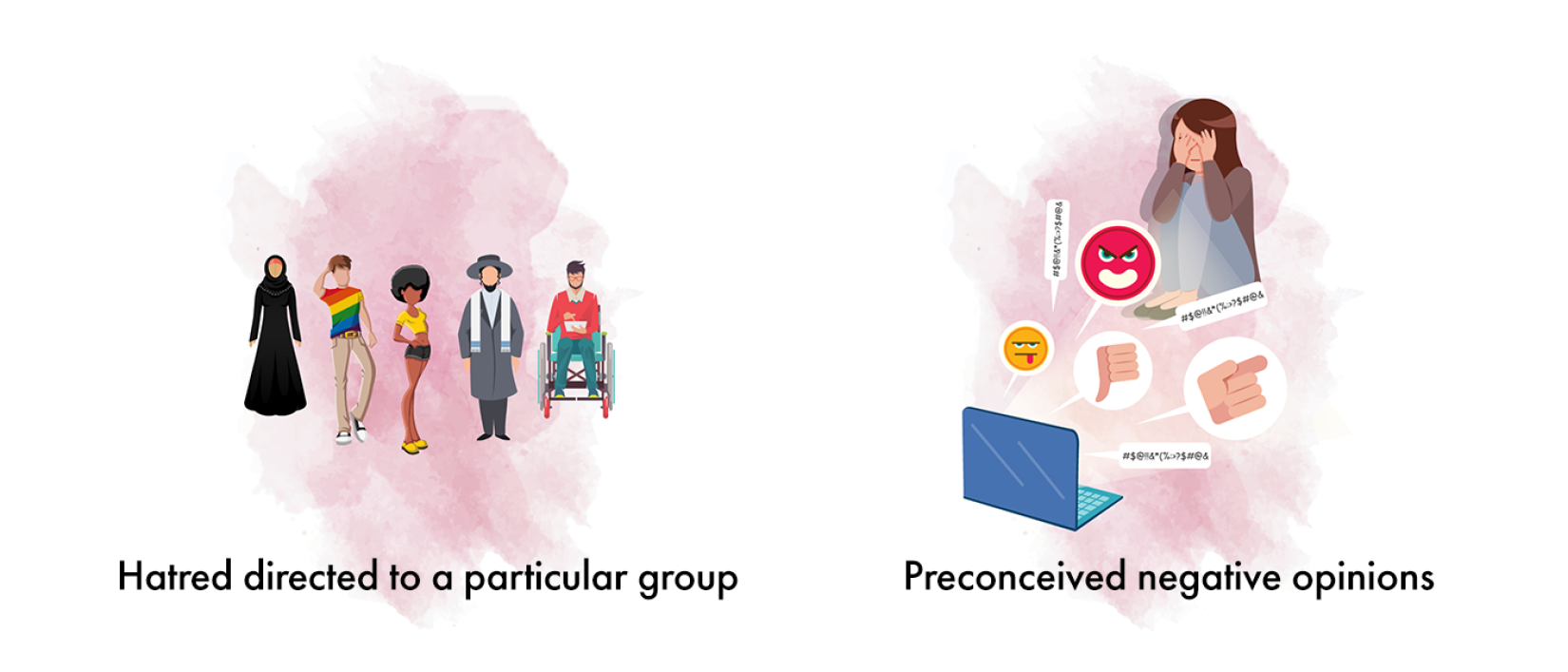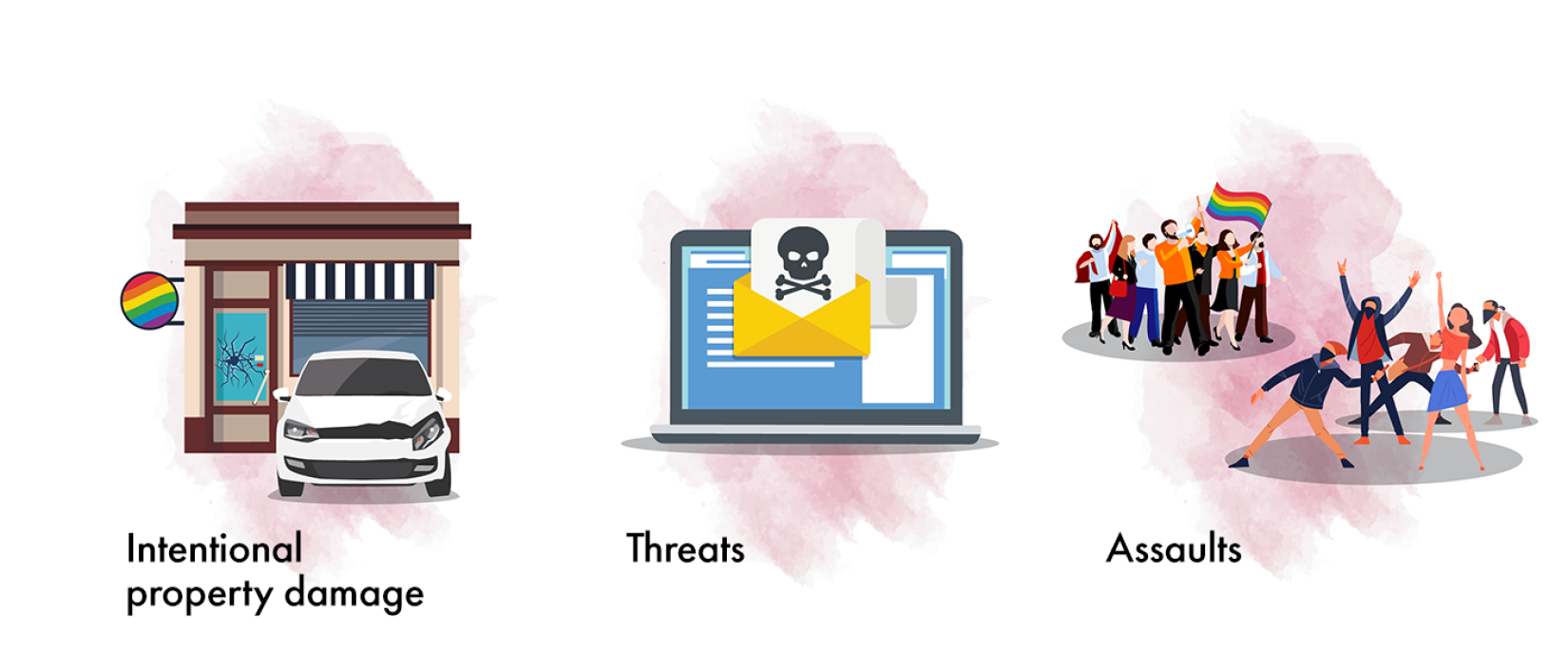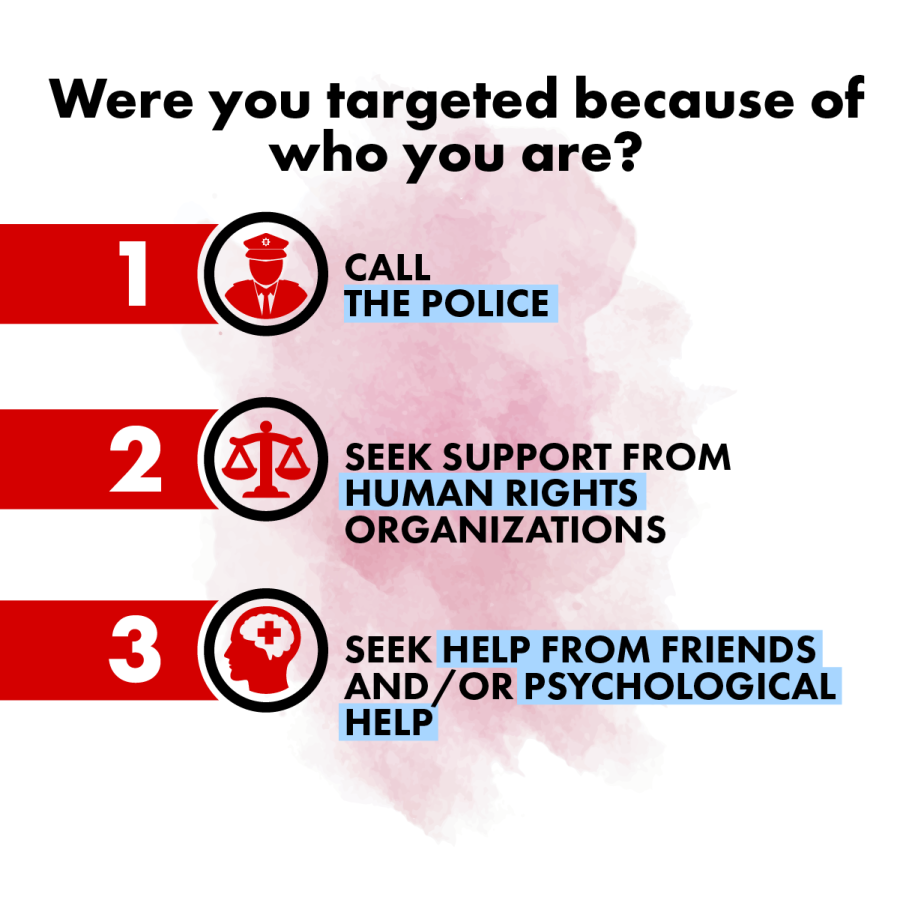.

Українською мовою — тут.
What is hate crime?
Hate crimes are criminal acts motivated by bias or prejudice towards particular groups of people.
To be considered a hate crime, the offence must meet two criteria:
- The act must constitute an offence under criminal law and cause physical, material or psychological damage (for example, threat, property damage, assault)
- The act must have been motivated by bias
Forms of bias motivations:
- Preconceived negative opinions or/and stereotypical assumptions
- Intolerance or hatred directed to a particular group or to those perceived to be members of a group that shares a common characteristic, such as race, ethnicity, language, religion, nationality, sexual orientation, gender or any other fundamental characteristic

Here are some examples of hate crimes:
1. Intentional property damage, for instance, damage of an office space, damage of the vehicle etc.
2. Threats, for instance, online or offline threats of physical integrity, threats of property damage, threats against an organization or an event etc.
3. Assaults, for instance, physical attacks.

IMPORTANT: Criminal Code of Ukraine has Article 161, which provides for liability for violating the equality of citizens depending on their racial, national affiliation, religious beliefs, disability and other grounds.
According to international law binding in Ukraine, such other grounds include sexual orientation and gender identity. It is important to make sure that a hate crime is qualified under Article 161 and not under Article 296 of the Criminal Code of Ukraine (hooliganism) that does not take into account bias motives.

What to do if you have been targeted by a hate crime?
- If you feel like you are in danger because of a situation which you find yourself in or you are being threatened (attack on the grounds of prejudice or other acts on the basis of hatred), try to immediately leave the area relocating to a safer place (closer to places where police could be, where CCTV cameras are or where there are people around) and ask for help from other people. This may not prevent a hate crime but at least there will be more witnesses.
- Call the police! Provide an address or describe your whereabouts as clearly as possible so that the police can find you quickly.
- If you have been assaulted physically, call an ambulance to get medical help and record sustained injuries, as well as refer to a forensic examination.
- Try to calm down and try to recall all the details of the event/attack. Every detail can be important and will help the police and your lawyer. Recall how it all started, place and time of the attack, how many perpetrators were there, how were they dressed (were they wearing any bright clothes), how did they call each other, how did they refer to you, what threats and offensive comments did they address to you, did they have any weapon, were there witnesses around.
- If you call the police, they are obliged to draw up a report on the spot and issue a police coupon. Be sure to carefully review the information included into the protocol. If the information does not match with what you have described or you consider necessary to add some information, request to rewrite or add such information. You are not obliged to sign the protocol if the information provided is incomplete or incorrect. You add a note to the protocol that the information is incorrectly stated in it, that you do not agree with it and the police refused to add/rewrite the information. Also, it is necessary to record the data of all police officers who arrived at the scene and communicate with the victim. The victim has the right to call another police patrol.
- Please see the example of a properly written complaint below.
- It is advisable that a police complaint includes detailed information about the crime (date, place, circumstances) and the perpetrators’ sex, age, height, race, weight, clothes and other distinguished characteristics. You can submit a police complaint on the day of the attack/event or on the following day. Provide detailed information on why you believe that the crime is bias motivated: were there threats and/or biased comments, why you believe you were targeted, any context such as upcoming or prior holiday or event, your appearance, what you may know about perpetrators’ affiliation and previous expressions of that group, including online, etc.
- It is important to deliver the most precise information and if offensive language was used you can and should record these comments exactly the same way as they were used by perpetrators. Mention if you sustained any injuries or if your property was damaged. Also, provide contact information of potential witnesses.
- If police refused to accept the police complaint on site, please note the reason for the refusal (in certain cases refusal could be also bias motivated and can constitute failure to investigate) and submit it in person in a police department that covers the area where the crime took place or send it by post by registered mail with a description of the attachment and a notification of receipt. If police refused to register your complaint in the police department, please get in touch with the Human Rights Department of the National Police in Ukraine:
E-mail: udpl@police.gov.ua
Telephone: (044) 254-75-88
Website: https://www.npu.gov.ua/about/struktura/struktura/upravlinnya-dotrimannya-prav-lyudini.html
- Within 24 hours of filing the police complaint, information about the criminal offense must be entered in the Unified Register of Pre-trial Investigations, and the pre-trial investigation body must appoint an investigator responsible for the criminal proceedings in the case. All photo/video evidence of the event/attack, explanations, questioning of witnesses should be conducted only after the complaint is registered in the Unified Register of Pre-trial Investigations.
- If within 24 hours after submission of the police complaint, the information was not entered into the Unified Register of Pre-trial Investigations, inaction of the pre-trial investigation body could be appealed to an investigating judge. Such appeal could be submitted within 10 days after the refusal or failure to enter information about the crime into the Unified Register of Pre-trial Investigations.
- If during the initial qualification, the case was not qualified under article 161 of the Criminal Code of Ukraine, such decision of an investigator can be challenged in court.
- It is advisable to seek legal support from a local human rights organization or the State free legal aid.
- Seek support from friends and family and get professional help from a therapist if needed.
Organizations that provide legal aid in cases of hate crimes:
Human Rights Center ZMINA
Focus: human rights defenders
- Website: https://zmina.ua/
- Tel: 044 272 42 52, 067 502 08 01
- Email: info@humanrights.org.ua
NGO “Nash Svit”
Focus: LGBTI
- Website: https://gay.org.ua/
- Tel: 095 273 03 09
- Email: nashmir@gay.org.ua
NGO “Insight”
Focus: LGBTI
- Website: https://www.insight-ukraine.org/uk
- Tel: 050 410 75 61
- Email: ngo.insight@gmail.com
Roma Women Fund “Chirikli”
Focus: Roma
- Website: http://www.chirikli.com.ua/index.php/ua/
- Tel: 044 486 21 60
- Email: Fond.chirikli@gmail.com
Congress of national communities of Ukraine
Focus: national minorities
- Website: http://kngu.org/
- Tel: 044 425 47 86
- Email: knou@ukr.net
State free legal aid
Focus: national minorities, LGBTI, persons with disabilities, IDPs and other categories
- Website: https://www.legalaid.gov.ua/
- Tel: 0 800 213 103
- Email: info@legalaid.gov.ua
LGBTI friendly psychological services:
NGO “Insight”: https://www.insight-ukraine.org/uk/page/psychological-services
Useful documents:
- Universal Declaration of Human Rights
- International Covenant on Civil and Political Rights
- European Convention on Human Rights
- Constitution of Ukraine
- Criminal Code of Ukraine
- Criminal Procedure Code of Ukraine
- Law of Ukraine “On the principles of prevention and combatting of discrimination”
Download Sample written crime complaint below





